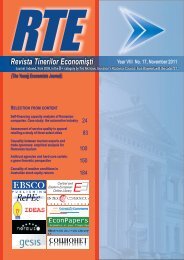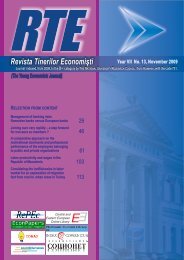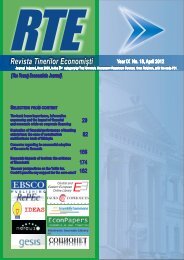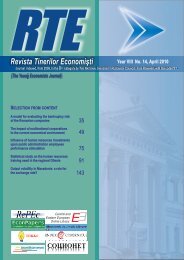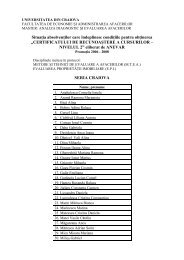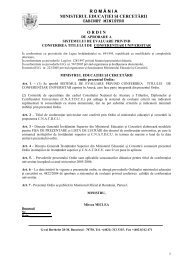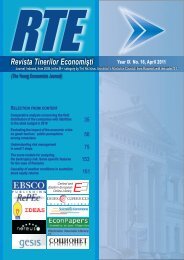Implications of change management in public administration
Implications of change management in public administration
Implications of change management in public administration
You also want an ePaper? Increase the reach of your titles
YUMPU automatically turns print PDFs into web optimized ePapers that Google loves.
Revista T<strong>in</strong>erilor Economişti (The Young Economists Journal)<br />
recently, banks have channeled resources ma<strong>in</strong>ly to loans and deposits and cash<br />
hold<strong>in</strong>gs.<br />
Today there is a tendency to modify the structure <strong>of</strong> bank liquidity, with<br />
earn<strong>in</strong>gs for the better. Thus, liquidity <strong>in</strong> the form <strong>of</strong> cash and deposits is <strong>of</strong>fset by the<br />
<strong>in</strong>crease <strong>of</strong> the share placement <strong>in</strong> securities or loans (which may be liquidized through<br />
the process <strong>of</strong> securitization). For example, <strong>in</strong> countries that have experienced the most<br />
dramatic reduction <strong>in</strong> the share hold<strong>in</strong>gs <strong>of</strong> cash and deposits (France and Brita<strong>in</strong>), was<br />
identified also the largest <strong>in</strong>crease <strong>in</strong> <strong>in</strong>vestment <strong>in</strong> debt securities (bonds), equities<br />
(shares) or loans.<br />
The share <strong>of</strong> hav<strong>in</strong>g cumulate securities (shares, bonds, the OPC) rose <strong>in</strong> all<br />
developed countries (<strong>in</strong> structure, debt securities are preferred <strong>in</strong>stead <strong>of</strong> shares). This<br />
shows that banks have acquired quality <strong>of</strong> first players first <strong>in</strong> segment <strong>of</strong> claim titles<br />
(they are titles net buyers), the <strong>of</strong>fer was less developed.<br />
The <strong>in</strong>crease <strong>in</strong> bank f<strong>in</strong>anc<strong>in</strong>g through money market securities or capital<br />
generates two challenges for bank <strong>management</strong>.<br />
First, it can be an <strong>in</strong>crease <strong>of</strong> <strong>in</strong>terest rate and liquidity risks s<strong>in</strong>ce: demand<br />
from <strong>in</strong>vestors for such securities is much more cyclical than for demand deposits;<br />
<strong>in</strong>creased dependence on f<strong>in</strong>anc<strong>in</strong>g by <strong>in</strong>terest rate developments. In the event that<br />
capital market yields are ris<strong>in</strong>g, the cost <strong>of</strong> bank resources by attract<strong>in</strong>g <strong>in</strong>creased more<br />
than deposits for f<strong>in</strong>anc<strong>in</strong>g. Similarly, low <strong>in</strong>terest rates allow a reduction <strong>in</strong> deposits<br />
faster than pay for securities.<br />
Second, f<strong>in</strong>anc<strong>in</strong>g through market <strong>in</strong>struments implies that the share <strong>of</strong> bank<br />
lenders with expertise <strong>in</strong> monitor<strong>in</strong>g bank that funds be <strong>in</strong>creased. As a consequence, <strong>in</strong><br />
the event <strong>of</strong> problems with that bank, the negative reaction from these lenders will be<br />
much faster and broader than <strong>in</strong> the case <strong>of</strong> depositors. However, the cost <strong>of</strong> f<strong>in</strong>anc<strong>in</strong>g<br />
could <strong>in</strong>crease especially for small banks and those with higher risk pr<strong>of</strong>ile.<br />
An analysis <strong>of</strong> the reality <strong>of</strong> the plan's hold<strong>in</strong>gs <strong>of</strong> securities by banks reveals<br />
the follow<strong>in</strong>g aspects:<br />
<strong>in</strong>volvement <strong>in</strong> possession <strong>of</strong> evidence is the prerogative <strong>of</strong> large banks <strong>in</strong><br />
particular;<br />
for large banks has been some uniformity <strong>in</strong> the distribution <strong>of</strong> <strong>in</strong>vestment <strong>in</strong><br />
securities;<br />
there are large banks that placed nearly 65% <strong>of</strong> the total debt balance sheet<br />
asset (the maximum level has been ris<strong>in</strong>g <strong>in</strong> recent years, until <strong>in</strong>ternational f<strong>in</strong>ancial<br />
crisis, which meant that there were large banks believe it is more efficient to <strong>in</strong>crease<br />
exposure <strong>in</strong> this direction);<br />
volatility <strong>in</strong> the securities placement has come to be superior for large banks,<br />
which could reflect the fact that large banks are not only the most important players on<br />
the securities market, but also the most dynamic and flexible portfolio restructur<strong>in</strong>g;<br />
large banks, <strong>in</strong> particular, <strong>in</strong>vest <strong>in</strong> the securities trad<strong>in</strong>g book (i.e. short term),<br />
while medium and small banks are us<strong>in</strong>g their resources for the purchase <strong>of</strong> securities<br />
issued by central and local authorities.<br />
The most spectacular developments on bank <strong>in</strong>vestment securities are recorded<br />
on the <strong>of</strong>f-balance-sheet, namely the derivative section. Banks' hold<strong>in</strong>gs <strong>of</strong> such<br />
securities have been <strong>in</strong> seven years (2000-2006) more dynamic than the aggregate<br />
bank<strong>in</strong>g assets <strong>in</strong> the last 35 years.<br />
For the case <strong>of</strong> euro area, banks are active <strong>in</strong> the area <strong>of</strong> protection buyers,<br />
while regional banks are act<strong>in</strong>g to protect sellers. Many <strong>of</strong> these banks have been<br />
24



